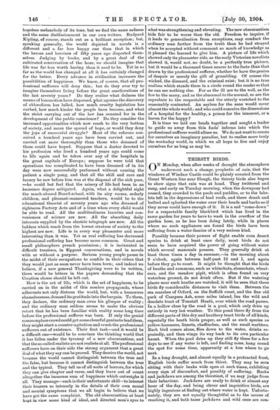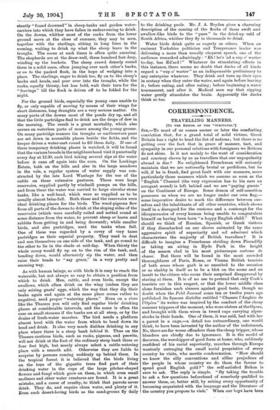O N Monday, when after weeks of drought the atmosphere underwent
such a change, prophetic of rain, that the windows of Windsor Castle could be plainly counted from the Great Western line near Slough, the thirsty birds also began to show signs that rain was at hand. They twittered and sang, and early on Tuesday morning, when the downpour had ceased, they crowded to the pools and puddles, or to the lake- lets left in the depressions of lead roofs, And there drank and bathed and splashed the water over their heads and backs as if they never could have enough of it. It is a sad "come-down" for a respectable family blackbird which has lived in the same garden for years to have to wash in the overflow of the garden hose, as he has been doing lately, while in places where no such appliances are found the birds have been suffering from a water-famine of a very serious kind.
Possibly because their powers of flight enable even desert species to drink at least once daily, most birds do not seem to have acquired the power of going without water which several mammals possess. They generally drink at least three times a day in summer,—in the morning about 9 o'clock, again between half-past 12 and 1, and again before they go to roost. It might be thought that the birds of heaths and commons, such as whinchats, stonechats, wheat- ears, and the meadow pipit, which is often found on very waterless ground, do not drink often. But if the watering places near such heaths are watched, it will be seen that these birds fly considerable distances to visit them. Between the sea marshes of Orford, on the Suffolk coast, and the fine old park of Carapsea Ash, some miles inland, lies the wild and desolate tract of Tunstall Heath, over which the road passes. In a hollow close by the road is a pool, which only dries up entirely in very hot weather. To this pond there fly from the different parts of this dry and heathery tract birds of all kinds, especially the heath birds proper, as well as such species as yellow-hammers, linnets, chaffinches, and the small warblers. Each bird comes alone, flies down to the water, drinks re- peatedly, and then wings its way back to its own particular haunt. When the pool dries up they still fly there for a few days to see if any water is left, and finding none, hang round the spot for some time, apparently at a loss where to go next.
In a long drought, and almost equally in a protracted frost, English birds suffer much from thirst. They may be seen sitting with their beaks wide open at such times, exhibiting every sign of discomfort, and possibly of suffering. Rooks and jackdaws are among the thirstiest, if we may judge from their behaviour. Jackdaws are ready to drink at almost any hour of the day, and being clever and inquisitive birds, are highly ingenious at finding out where water is kept. Unfoitu- nately, they are not equally thoughtful as to the means of reaching it, and both tame jackdaws and wild ones are con- atantly "found drowned" in sheep-tanks and garden water- carriers into which they have fallen in endeavouring to drink. On the downs, whither most of the rooks from the lower• ground move at the close of summer, they may be seen, together with the starlings, sitting in long lines in the evening, waiting to drink up what the sheep leave in the troughs. The scene at such times is often quite amusing. The shepherds are at the draw-well,- three hundred feet deep, winding up the buckets. The sheep crowd densely round them in a solid mass, often jumping over each other's backs, or on to the packed flock, in the hope of wedging• into a place. The starlings, eager to drink too, fly on to the sheep's backs and heads, and peer over into the troughs, while the rooks, equally thirsty, but less bold, wait their turn for the " leavings " till the flock is driven off to be folded for the night.
For• the ground birds, especially the young ones unable to fly, or• only capable of moving by means of their wings for short distances, long droughts are a very serious matter•. On many parts of the downs most of the ponds dry up, and all that the little partridges find to drink are the drops of dew in the morning. The result is a great mortality, which also occurs on waterless parts of moors among the young grouse. On many partridge manors tin troughs or earthenware pans are set down in accessible places beside the fields, and the keeper drives a water-cart round to fill them daily. If one of these temporary drinking places is watched, it will be found that the various broods in the neighbourhood visit it punctually every day at 12.30, each bird taking several sips at the water before it runs off again into the corn. On the Lockinge Estate, both on the hills and also in the large meadows in the vale, a regular system of water supply was con- structed by the late Lord Wantage for• the use of the cattle on these extensive pastures. There were large reservoirs, supplied partly by windmill pumps on the hills, and from these the water was carried to large circular stone tanks, like a well-head, which were so supplied as to be usually almost brim-full. Both these and the reservoirs were ideal drinking places for the birds. The wood-pigeons flew from all parts of the downs to drink at the sloping sides of the reservoirs (which were carefully railed and netted round at some distance from the water•, to prevent sheep or hares and rabbits from getting in and being drowned) ; while smaller birds, and also partridges, used the tanks when full. One of these was regarded by a covey of very tame partridges as their especial property. They used to dust and sun themselves on one side of the tank, and go round to the other to lie in the shade at mid-day. When thirsty the whole covey would fly up on to the rim of the tank, and, bending down, would alternately sip the water, and then raise their heads to' " say grace," in a' very pretty and amusing way.
As with human beings, so with birds it is easy to reach the waterside, but not always so easy to obtain a position from which to drink. Men, cattle, and even birds, except the swallows, which often drink on the wing (unless they are only seizing gnats' eggs, which the way that they dip their beaks again and again at the same place seems rather to negative), need propar• "watering places." Even on a river like the Thames you will only find regular birds' drinking places at considerable intervals, and the same is often the case on small streams if the banks are at all steep, or by the drains of fresh-water marshes. The bird needs a platform almost level with the water from which to bend down its head and drink. It also very much dislikes drinking in any place where there is a steep bank behind it. Thus on the Thames cautious birds, such as rooks, pigeons, and peewits, will not drink at the foot of the ordinary steep bank three or four feet high, but nearly always select a cattle-watering place with a smooth adit. Otherwise they are liable to surprise by persons coming suddenly up behind them. In the tropical forest it is believed that the birds living on the tops of the gigantic trees find part of their drinking water in the cups of the large pitcher-shaped flowers and fungi which grow on them, in which even small molluscs and other water creatures are found. It is a great mistake, and a cause of cruelty, to think that parrots never drink. They do, and require clean water, and plenty of it. Even such desert-loving birds as the sand-grouse fly daily to the drinking pools. Mr. J. A. Bryden gives a charming description of the coming of the flocks of these swift and 'swallow-like birds to the " pans " in the dried-up veld of South Africa, whither they fly in thousands to drink.
Water birds drink quite as eagerly as others. When an 'eminent Yorkshire politician and Temperance leader was delivering a more than usually eloquent speech, one of the audience remarked admiringly : "Eh ! he's 'ad a sup o' wailer to-day, has Ed'ard !" Whatever its stimulating effects in this instance, there seems no doubt that ducks of all kinds regard a "sup o' waiter" as an indispensable preliminary to any enterprise whatever•. They drink and turn up their eyes in ecstasy when they enter• the water•, and again before leaving it; before eating, and after eating; before beginning a water tournament, and after it. Medical men say that sipping water gently stimulates the brain. Apparently the ducks think so too.







































 Previous page
Previous page